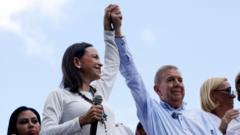Venezuela's government has placed a $100,000 reward for tips leading to the capture of Edmundo González, a contentious political figure who gained both notoriety and a support base in his recent attempt to challenge President Nicolás Maduro. González, who left the country in September, claims that the electoral process has been marred by malfeasance, with the government failing to release critical voting tallies following the July elections, which purportedly declared Maduro the winner. In the face of accusations of conspiracy and document forgery, González symbolically distanced himself from Maduro's regime, voicing plans to engage with Latin American leaders and bolster opposition efforts regionally.
The political landscape in Venezuela remains deeply polarized, with divisions intensifying over the past decade. González's rise from obscurity highlights a growing discontent among voters against Maduro, amid accusations of election malpractice and historical mismanagement. As the opposition solidifies its claims of electoral irregularities, the UN Human Rights Committee's involvement adds an international dimension to Venezuela's political turmoil.
González’s approach and declarations starkly contrast with Maduro’s rhetoric, signifying a major ideological gulf between the government and opposition factions. As the country navigates these contentious political waters, the implications of González's exile and the government's steadfast stance will undoubtedly shape the future of Venezuela's governance.
The political landscape in Venezuela remains deeply polarized, with divisions intensifying over the past decade. González's rise from obscurity highlights a growing discontent among voters against Maduro, amid accusations of election malpractice and historical mismanagement. As the opposition solidifies its claims of electoral irregularities, the UN Human Rights Committee's involvement adds an international dimension to Venezuela's political turmoil.
González’s approach and declarations starkly contrast with Maduro’s rhetoric, signifying a major ideological gulf between the government and opposition factions. As the country navigates these contentious political waters, the implications of González's exile and the government's steadfast stance will undoubtedly shape the future of Venezuela's governance.


















